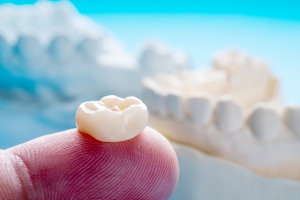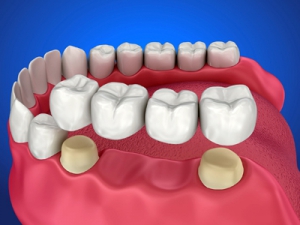What is a dental crown?
Crowns are placed on damaged teeth to protect them, cover them, and restore their shape. Dental crowns come in different types and have various benefits, so it’s essential to understand what they are and what the different types of crowns can do for you. By understanding the dental crown process and the benefits of dental crowns, you’ll be better prepared to make the most of your dentist’s time. Keep reading to learn all about dental crowns!
Why would I need a dental crown?
The dental crown is a prosthetic that replaces part of a tooth that has eroded or been lost due to decay or trauma. Dental crowns are custom-made for each individual and can be fitted in just one visit to the dentist’s office. Dental crowns are usually reasonably affordable (depending on the type and quality), so it’s worth considering if you need one! In addition, dental crowns are crucial oral health measures that can help to strengthen teeth and prevent future damage, making them an essential oral health measure.
What are the benefits of dental crowns?

Healthy teeth are the foundation of a healthy mouth, so the crowns are the perfect solution for people who have lost teeth or damaged them. Crowns are a replacement for teeth that have been lost or damaged and provide many benefits, such as increased tooth strength and stability, better oral hygiene, and a beautiful smile. It is possible to make crowns from a variety of materials – porcelain, metal, plastic – so they look unique on each person’s teeth. They’re cost-effective and provide many benefits, such as increased tooth strength and stability, better oral hygiene, and a beautiful smile. A dental crown is a wonderful solution for people who want to improve the appearance of their teeth but don’t want to undergo surgery or take significant time off from work. Different components can be used to make dental crowns – porcelain, metal, plastic – so they look unique on each person’s teeth.
Types of dental crowns
Dental crowns are a type of treatment that helps repair teeth that have suffered from decay or other damage. Different materials can be used to make them, including metal, porcelain, and glass. Crowns are often custom-made to match the specific needs of each patient. For example, crowns may be used to replace one or more teeth, cover a gap in the tooth structure, or support an implant (dentist-made replacement for a missing tooth). If you’re considering getting a dental crown, knowing the available types and their benefits is essential. Then, make an informed decision by consulting a dentist to see which type of crown is the best for your specific needs.
How do dental crowns work?
 Dental crowns are a kind of dental treatment that can be a lifesaver. They’re often used to correct problems like tooth decay, overcrowding, and crooked teeth. Dental crowns are available in a variety of materials – like gold, porcelain, stainless steel, and titanium alloys – in a variety of shapes and sizes. If you have questions about how dental crowns work or whether you need one, don’t hesitate to ask your dentist! The dental crown is a type of restoration that replaces missing teeth with metal or ceramic fixtures. The materials used to make crowns include gold, porcelain, stainless steel, and titanium alloys – and they come in many shapes and sizes.
Dental crowns are a kind of dental treatment that can be a lifesaver. They’re often used to correct problems like tooth decay, overcrowding, and crooked teeth. Dental crowns are available in a variety of materials – like gold, porcelain, stainless steel, and titanium alloys – in a variety of shapes and sizes. If you have questions about how dental crowns work or whether you need one, don’t hesitate to ask your dentist! The dental crown is a type of restoration that replaces missing teeth with metal or ceramic fixtures. The materials used to make crowns include gold, porcelain, stainless steel, and titanium alloys – and they come in many shapes and sizes.
How is my tooth prepared for a dental crown?
When it comes to dental crowns, there’s a lot of information to take in. That’s why we’ve put together this guide to help you understand what crowns are, how they’re fitted, and the benefits of having one. Before anything else, it’s essential to know that crowns are a type of partial denture – a particular dental appliance that replaces one or more teeth. Crowns often restore stability and appearance to teeth damaged by periodontal disease (gum disease). A crown can be made from a variety of materials, including metal alloy, porcelain fused to metal plates, or plastic. The most important part of having a dental crown is to ensure your tooth is well-prepared for it – cleaning the cavity thoroughly and removing any underlying decay with an oral probe before placing the crown on the tooth. We hope this guide has helped you gain a better understanding of crowns.
Does a crowned tooth require any special care?
A dental crown is a particular tooth implant designed to last longer than regular teeth. Crowns are often considered the crowning glory of dentistry, as they provide a natural-looking enhancement to the teeth. However, crowns require only primary care like any other type of tooth implant. If your height starts to come loose or fall off, remove it and replace it with a new one. Crowns are designed to last longer than regular teeth, so you don’t need to worry about them becoming obsolete soon. In the meantime, keep your crowns clean and healthy by brushing and flossing them regularly.
What problems can develop with a dental crown?
 When considering getting a dental crown, it’s essential to understand the different types of crowns and their specific benefits and drawbacks. You can choose the right style based on your particular needs and consult a dentist to understand the available heights better. Dental crowns can help restore the aesthetics of teeth, reduce the risk of decay, and improve chewing ability. Different types of dental crowns are available on the market, each with its benefits and drawbacks. Again, it’s essential to choose the right style for your specific needs and consult with a dentist to understand the crowns available to you better.
When considering getting a dental crown, it’s essential to understand the different types of crowns and their specific benefits and drawbacks. You can choose the right style based on your particular needs and consult a dentist to understand the available heights better. Dental crowns can help restore the aesthetics of teeth, reduce the risk of decay, and improve chewing ability. Different types of dental crowns are available on the market, each with its benefits and drawbacks. Again, it’s essential to choose the right style for your specific needs and consult with a dentist to understand the crowns available to you better.
Frequently Asked Questions
How long do dental crowns last?
Dental crowns are a long-term solution for fixing teeth damaged or lost due to decay and other causes. They are typically used in cases where the tooth is either too severely compromised or not salvageable at all. Crowns last anywhere from two to five years, but they can last up to 10 years under optimal conditions.
How much does a tooth crown cost?
A dental crown is a restoration procedure that replaces a tooth that has lost its structure or has been damaged. The peaks are made of porcelain, metal alloy, or both materials to ensure durability and strength—a typical dental crown costs between $1,000 and $3,000.
Are dental crowns painful?
The dental crowns are custom-made to fit your unique teeth and mouth, so they will usually be painless. The purpose of a dental crown is to replace part or all teeth. Common side effects of dental crowns include headache, jaw ache, toothache, swelling, and redness around the gums. However, as with any new dental treatment, it’s always best to talk to a dentist about your specific case before making any decisions.
Is it worth getting a crown on your tooth?
There is no one-size-fits-all answer to this question, as the value of dental crowns can vary depending on the individual’s oral health history, tooth type, and preferences. However, dental crowns are a more expensive restoration procedure that lasts longer and may provide better results than other types of dental treatments. When selecting a crown, it is essential to consider your dentist’s recommendations and the surrounding tooth structure. For example, metal crowns are generally heavier and may be more durable than porcelain crowns. Composite crowns are a mix of metal and plastic materials that offer good durability and responsiveness. Finally, always visit your dentist regularly for check-ups and dental crowns updates to ensure long-term decay prevention and oral health improvement.
What are the benefits of having dental crowns?
Crowns are dental repairs that replace a tooth’s entire root and crown. Crowns also help restore your smile by fixing missing teeth, correcting gaps, and restoring your natural oral hygiene abilities. The benefit of having a crown is that it strengthens the tooth and prevents it from breaking or cracking in the future.
How do I choose the right type of dental crown for my needs?
When choosing the right type of dental crown for your needs, it is essential to consider the chewing abilities of the animal you have feeding duties. Fixed Crowns are the most durable and will last the longest as they don’t need constant adjustment or maintenance. Semi-Fixed Crowns are the second-most durable type of crown and can be adjusted if the animal chews excessively. Screwed Crowns are the least-durable type of crown, and Unscrewed Crowns are the most durable type of crown, requiring more regular adjustment.
Are there any other steps I need to take after getting a dental crown?
Yes, there are a few additional steps that you will need to take after getting dental crowns put on. First and foremost, you will need to schedule a follow-up appointment to ensure that the dental crown is working well and that any adjustments have been made. In addition, regular teeth cleanings while wearing the dental crown are also highly recommended to help prevent tooth decay and plaque buildup. Last but not least, at the next appointment, your dentist may measure and adjust the crown if it has shifted or moved since it was initially put on.
Conclusion
A dental crown is an essential dental restoration that provides protection and repair to the tooth. It is typically used to replace a tooth that has suffered decay, decay-related fracture, or dental implant failure. Dental crowns come in various shapes, sizes, and colors to suit your unique tooth restoration needs. If you’re interested in dental crowns and want to know more about heights’ different types and benefits, check out our website. In the meantime, feel free to ask any questions you may have in the comments below!



